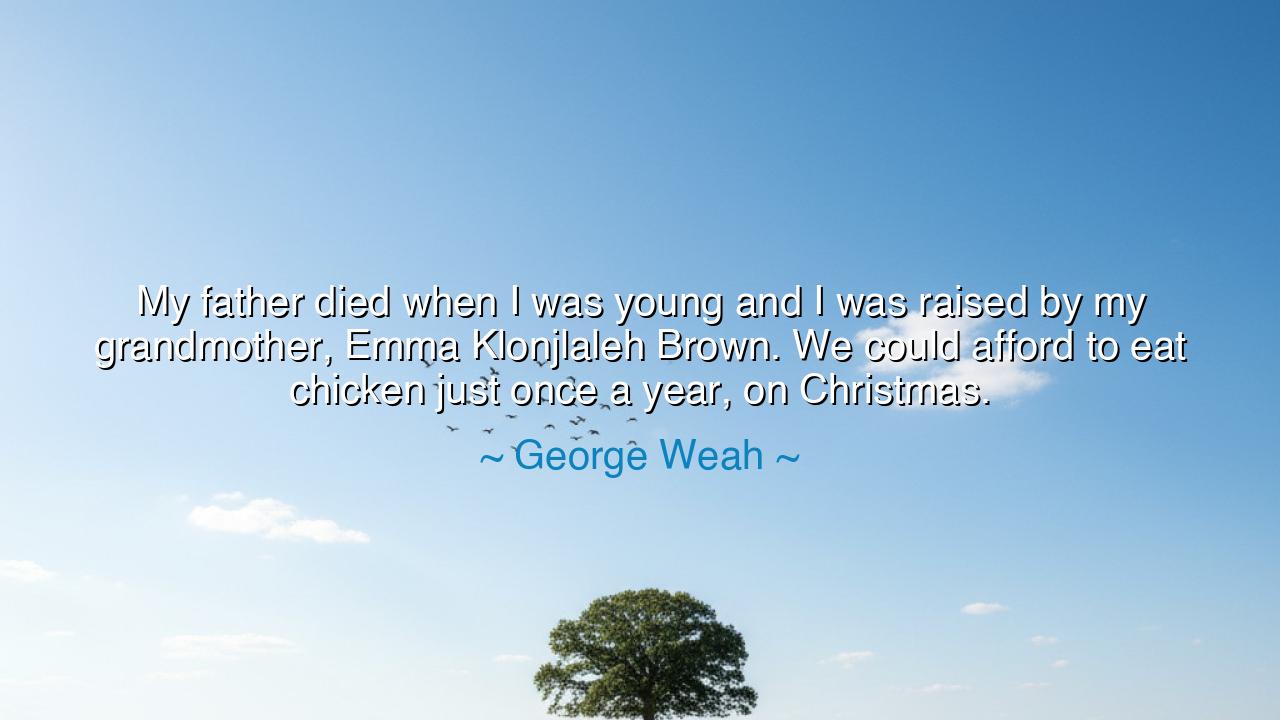
My father died when I was young and I was raised by my
My father died when I was young and I was raised by my grandmother, Emma Klonjlaleh Brown. We could afford to eat chicken just once a year, on Christmas.






Opening Scene
The gentle glow of the evening light fills the room, casting soft shadows across the floor. Jack and Jeeny sit together at the kitchen table, their mugs of tea steaming in front of them. The world outside is fading into twilight, the noise of the day softened as they settle into a peaceful moment. The warmth of the room contrasts with the weight of the conversation, which has shifted toward something personal and meaningful.
Host: The quiet is almost palpable, with only the faint rustle of a breeze through the window interrupting the stillness. Jeeny, lost in thought, looks at Jack and shares a quote that has been on her mind.
Jeeny: (softly, her voice gentle) “I came across something by George Weah that really struck me. He said, ‘My father died when I was young and I was raised by my grandmother, Emma Klonjlaleh Brown. We could afford to eat chicken just once a year, on Christmas.’ Isn’t that such a poignant reflection on his childhood? The idea of how limited their resources were, and yet, how they made the most of what they had.”
Jack: (nodding slowly, his voice reflective) “It really is. It paints such a vivid picture of sacrifice, of resilience. To have something as simple as chicken once a year, on Christmas, gives us a sense of how difficult life was for him, how much they had to prioritize just to get by. And yet, it also shows the value of what they had — the importance of family, tradition, and cherishing those moments together.”
Jeeny: (smiling faintly, her voice thoughtful) “Exactly. It’s not just about the scarcity of food; it’s about what that scarcity taught him. The limited resources didn’t mean a lack of love or care. It meant finding joy in the small moments, in the things that truly mattered, even when there wasn’t much else to hold onto. It shows how powerful tradition can be, and how it’s often the things we don’t have that make us appreciate what we do have more.”
Host: The stillness in the room deepens as Jack reflects on the weight of Weah’s words. The flicker of the lamp adds a quiet rhythm to their conversation, as if the room itself is filled with the recognition of something profound. Jeeny watches Jack, her expression thoughtful, sensing the depth of their shared understanding.
Jack: (his voice gentler, almost with a sense of awe) “It’s humbling, isn’t it? To think about how Weah’s childhood was shaped not just by hardship, but by the way they made the most of what they had. One meal a year, yet that meal carried so much meaning — it wasn’t just about food, it was about connection, about the love that was shared in that small moment. It’s a reminder that the value of things isn’t just in how much we have, but in how we cherish what we do have.”
Jeeny: (nodding, her voice softer, almost as if contemplating something deeper) “Yes, exactly. We often get caught up in the idea of abundance, of wanting more, but we forget that true wealth is in what we value, in what we give meaning to. The scarcity of food didn’t take away from the richness of their family life. In fact, it probably made those moments even more precious, because they were hard-earned, they were special.”
Host: The quiet between them grows, as if the weight of Weah’s words has settled into something more than just a reflection on childhood hardship. The flicker of the fire seems to mirror their thoughts, soft and steady, casting light on the realization that scarcity doesn’t necessarily mean deprivation. In some cases, it can lead to a deeper appreciation for the things we hold most dear.
Jack: (his voice reassured, almost with a hint of gratitude) “It’s an interesting way to look at it. The value isn’t in the abundance, but in the ability to appreciate what we have, in the moments we get to share with others. Weah’s story is a reminder that even in the hardest times, we can find something to celebrate, something to hold onto.”
Jeeny: (smiling warmly, her voice affirming) “Exactly. It’s about finding richness in the simplicity of life, in the small joys that make up our days. Even something as small as a single meal once a year can carry so much meaning when it’s shared with those we love.”
Host: The evening stretches on, but the room feels fuller now, filled with the understanding that true richness doesn’t come from material abundance, but from the moments of connection and love we share. Jack and Jeeny sit together, the warmth of the room reflecting their shared recognition that the true wealth of life lies in how we cherish the small, meaningful moments. The world outside continues, but inside, they sit in the peace of knowing that abundance is often found not in what we have, but in how we appreciate what we’ve been given.






AAdministratorAdministrator
Welcome, honored guests. Please leave a comment, we will respond soon